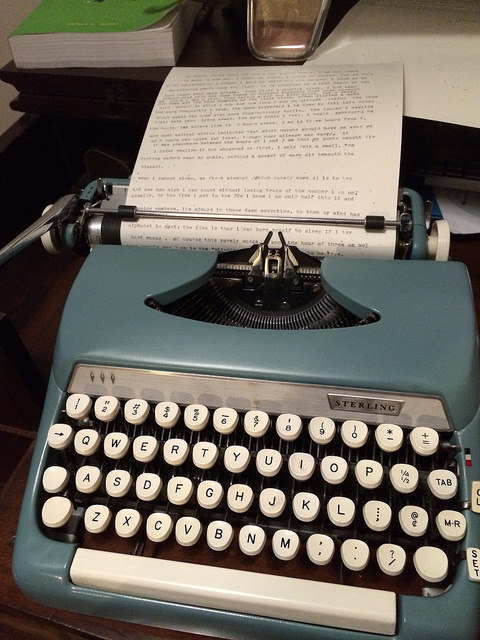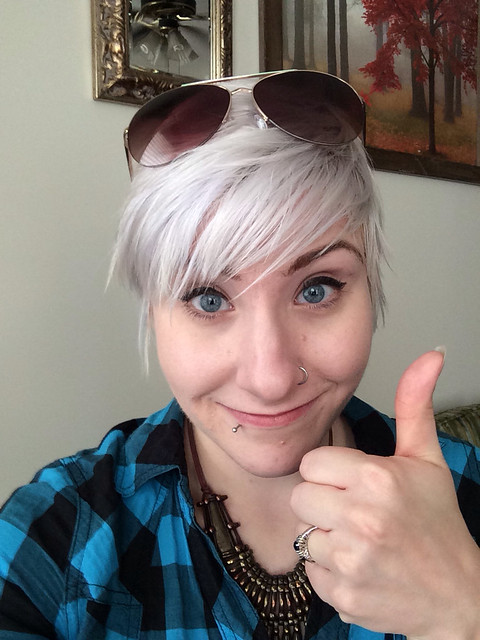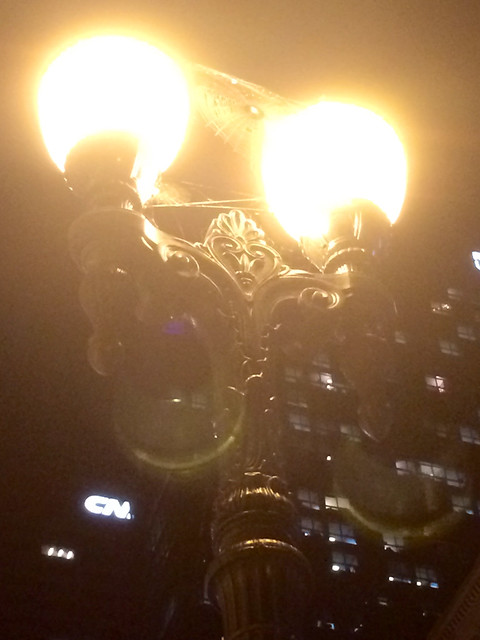
Postulation on Process
As I’m writing this, I’m halfway through week two of the semester and it feels like summer is a distant memory.
I noticed it around this time last year, and maybe it’s mental, but the first day of September brought about a distinctive change in the weather, in the feeling of the sun. Today was the first slightly chillier day, reminding me that fall is just around the corner. My mood and my production seems to ebb and flow with the change of seasons, fall tending to be a time of furious productivity, whether I’m a student or not. With the transition from my more lackadaisical schedule in the summer to the highly structured schedule I’ve imposed upon myself as I try to balance teaching, attending class, writing, reading, and working, I’ve been thinking a lot about my process.
Days before our first class meeting, Jenny Boully sent out an email asking if anyone had a typewriter they could bring to class. In high school, I had purchased an aqua Smith Corona typewriter from a rummage sale for $5, and I’ve been hauling it around the country, from apartment to apartment, ever since. Uncertain what we would be doing, but excited nonetheless, I volunteered my typewriter, packed it up, and took it downtown for our first class.

Day One, Year Two: Let’s Do This!
While I love my typewriter, unfortunately, in the past couple years, I haven’t been using it as much as in the past, more often opting to compose on my computer. I write in journals and notebooks when out and about or when I am in bed, but typically, I do most of my writing on the computer when I’m at home. It just feels the most natural; it’s the way of writing I fall into without even thinking.
Sitting before the keys in workshop, had forgotten how freeing it is to use a typewriter. Many of my classmates did not share this feeling (some finding it uncomfortable or disliking the inability to backspace and erase, like a word processor), but after that class, my love for my typewriter was effectively reignited. For me, I am drawn to the physicality of typewriting—you need to hit the keys hard. When you type a lot, your wrists and arms begin to ache—proof of your exertion. Most importantly, in my view, is the materiality of the experience.
My classmates have begun to recognize the role technology plays in my writing, how I constantly interact with and interrogate it and the role it plays in our lives, so perhaps it is surprising that I am so drawn to this artifact of the 20th century. My typewriter used to belong to a doctor that lived in Pennsylvania. I learned this when I purchased it due to a label that had been affixed onto the case. Curious, I had tried to find more information about the former owner with no luck.

Reigniting My Typewriter Love
A computer is such a personal thing, filled with words and images and places to hide. Our keyboards are places that we live and work. In some ways, I feel like I’m sneaking around someone else’s home when I sit at the typewriter due to my connection to my computer keyboard, but I am most haunted by the vast and intangible hypothetical permanence that technology affords. I have hundreds of documents in my computer, backed up in external hard drives, stored in “the cloud,” but unless I print these documents out, I have no physical, tangible proof of my efforts; I am disconnected from the work when the electricity is cut. As I type on my laptop, I watch the words populate the screen, but they are really images. I touch the screen and the letters feel the same as the empty “page.”
When I typewrite a page, I can lift it from the carriage and run my fingers over the paper, feeling the dips and dents pressed into the paper. I can watch the pages pile up. When I am typing at the typewriter, I work at lightening speed, not stopping to think, not erasing entire pages, paragraphs, or lines. I move. The possibilities of permanence create momentum and carry me across the page.
I enjoy the inability to erase, the fact that I have to live with what I put on the paper. I can revise, and I do, by taking a pen to my work, or retyping it in a word processor, but I always know where it was I started. Since that class, I have been using the typewriter more, exploring the possibilities of creation, just by changing the medium in which I work.
For many people, we have our set ways and rules for creating, but what could happen if you broke your own rules, ever so slightly?

